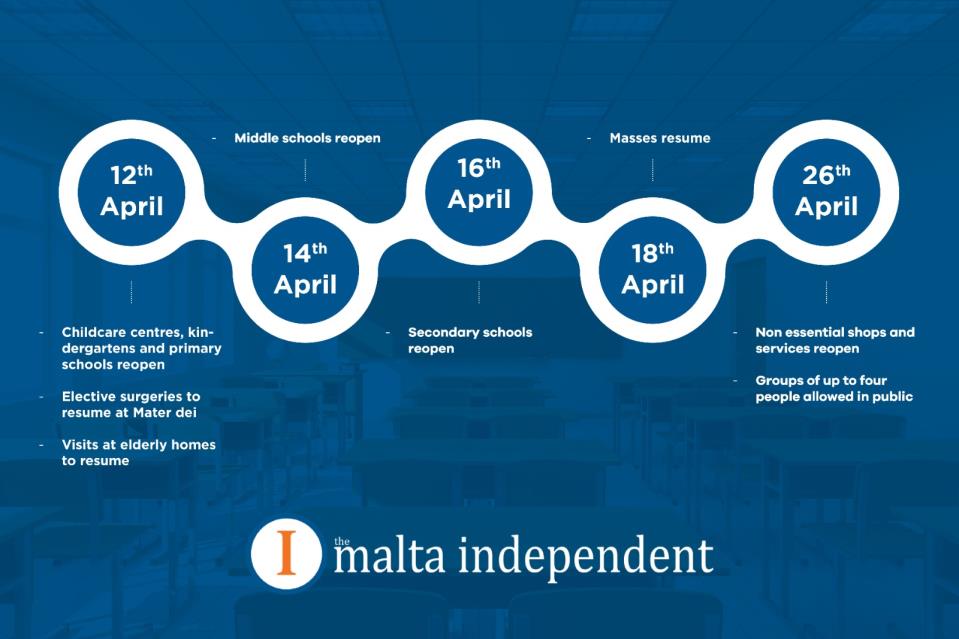Schools will physically reopen their doors as from next week, while non-essential shops and services will be opened as of 26 April.
Addressing a press conference, which can be viewed below, Prime Minister Robert Abela said that education and the elderly will be the priority of the country's reopening plan as announced today.
Malta has been in a semi-lockdown similar to what it was in last year since the beginning of March, with the measures set to expire on 11 April.
The Prime Minister said that as from 12 April, schools and educational institutions will begin to open.
On 12 April, childcare centres, kindergartens, and primary schools will open. Two days later - on Wednesday 14 April - middle schools will open, and on Friday 16 April, secondary schools (from Form 3 to Form 5) will open their doors.
Post-secondary educational institutions will remain constrained to online learning.
As from 12 April as well, elective surgeries will once again restart at Mater Dei Hospital, while visits will once again be allowed at elderly care homes where 90% of the residents have received both doses of the vaccine and 14 days have passed since the second dose.
The Prime Minister said that non-essential shops and services will then reopen on 26 April, and the two-person in public rule will increase to four people as from 26 April as well.
The government also said that masses will once again be allowed to take place from Sunday 18 April.

All other measures will remain in place for now with a continued emphasis on enforcement. Abela said that this is a bi-directional approach, meaning that the measures maybe reversed if pressure on Malta's hospitals increases again.
The dates for further relaxation of measures will depend on how the circumstances develop, Abela said.
Abela said that 1 June is being targetted as the date for the reopening of tourism in a more pro-active manner, and said that the government has 20 million euros set out for helping bars and restaurants make the most of the summer.
Speaking about the vaccination drive, Health Minister Chris Fearne said that 42% of the adult population in Malta has received at least one dose of the vaccine.
The vaccination rates for different cohorts stands at: 95% of those over 80 years of age; 86% of those over 70 years of age; 76% of those over 60 years of age; and 86% of those who are medically vulnerable have received at least one dose.
He said that, amidst concerns on the AstraZeneca vaccine, a meeting will be taking place later today to discuss the way forward in this regard. There have been no cases of blood clots related to the vaccine in Malta. He said, however, that there is no doubt whatsoever that the vaccine is effective against Covid-19 - the discussion in a number of countries and in the EMA is whether there are any alarming side-effects; so far, the EMA has not given such advice - the advice thus far is that the benefits of giving the vaccine is a lot more than any possible side-effects.
The number of people in hospital has decreased significantly: in mid-March, an average of 140 people were receiving treatment in Mater Dei Hospital - this is now down to 41 as of yesterday. In ITU this has gone from a peak of 31 Covid-19 patients, to 8 patients with Covid-19 and another 7 who do not have Covid-19 but are still receiving treatment there having recently recovered. In Gozo, the numbers have gone down from 5 to 1.
Asked by The Malta Independent about whether the government is considering mass events for summer, the Prime Minister said that it would be "premature" to hold such a discussion now.
"The approach we are following is, firstly, based on science, and is a prudent and cautious one. One has to see how the situation evolves in the coming weeks and months; when it comes to the decision regarding more risky events, we will take that in due time."
Prof Gauci also told this newsroom, when asked about consultation with the Malta Union of Teachers - which had said that schools shouldn't be the first to reopen, that once a week, she meets the unions to discuss the situation with them.
"Last Monday, together with Education Minister Justyne Caruana, we met with the MUT and we heard their concerns and explained to them the data that we were seeing, where spread among children has decreased rapidly," she said.
Gauci also reminded that teachers are also vaccinated, which has an impact on the spread of the virus in schools.
The Deputy Prime Minister also told this newsroom that the vaccination program is going better than was initially planned. "In these weeks, we would have finished the cohort of over 60s and of vulnerable people."
He recapped that in the next few week, the strategy will be somewhat different as after this cohort finishes, instead of sending out invites, the vaccination program "will open according to age and people who fall in those categories would be able to apply online or via SMS."
The Prime Minister said that "the Government was always humble" and that the government had apologised for its wrongdoing.
Regarding the AstraZeneca vaccine, Fearne said that "there is no doubt that the vaccine works" as its efficacy rate is high, but the Government will see what the EMA has to say about its rare side-effects in the following hours. He also said that there were no cases of thrombosis from it in Malta.
Fearne also pointed out that Malta needs to make a few more sacrifices so it can reap the fruits of being vigilant now by being an appealing country for touristic activity.
"We are in a unique position that if we stay well, we would be in a green list in the UK for travelling, so for the next few weeks, we need to make some sacrifices."
Watch the press conference below: